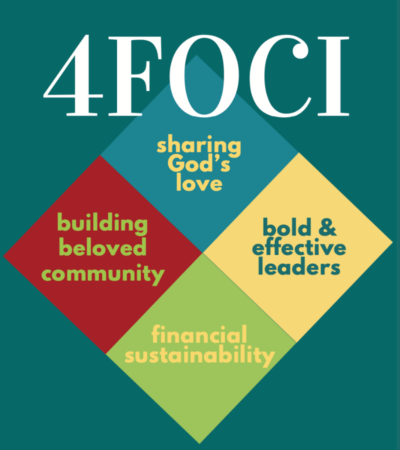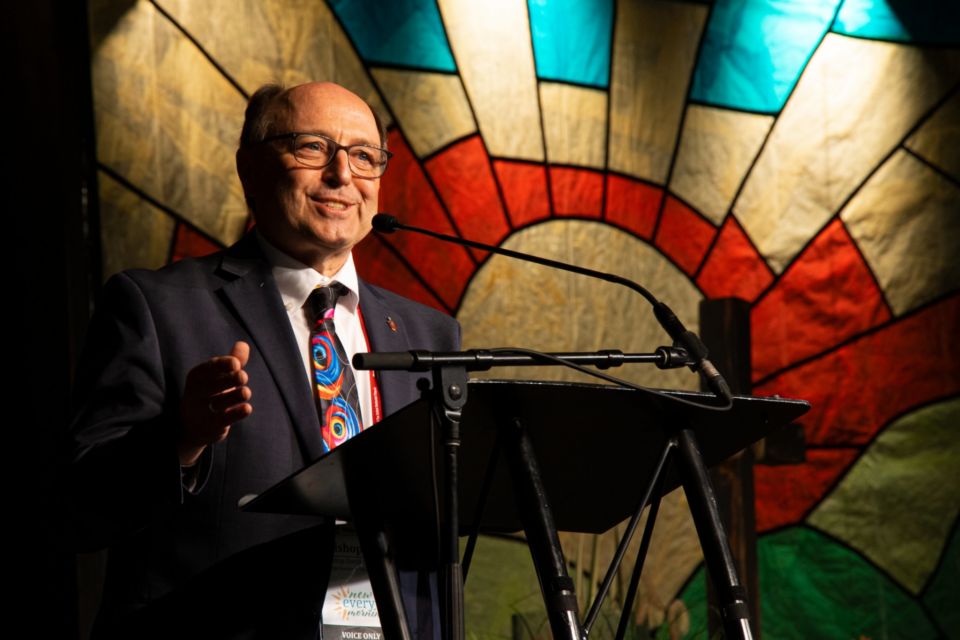On November 23, Bishop David Bard begins a four-stop tour to hear from people following significant changes in The United Methodist Church.
JAMES DEATON
Content Editor
Bishop David Bard announced a listening tour to meet with United Methodists as he begins his final term as resident bishop of the Michigan Conference. The tour will start in Marquette on November 23. This is the first of four stops, concluding on January 11 in Grandville. The sessions will not be live-streamed or recorded.
The bishop invites people to find the nearest session to them and join him for conversation:
Saturday, November 23, 2024
Marquette: Hope UMC’s Connection Center
927 W. Fair Ave., Marquette, MI 49855
10:30 am to 12:30 pm Eastern
Sunday, December 8, 2024
Southfield: Hope UMC
26275 Northwestern Hwy., Southfield, MI 48076
3:30 to 5:30 pm Eastern
Saturday, December 14, 2024
Midland: First UMC
315 W. Larkin St., Midland, MI 48640
10:30 am to 12:30 pm Eastern
Saturday, January 11, 2025
Grandville UMC
3140 Wilson Ave., Grandville, MI 49418
10:30 am to 12:30 pm Eastern
Bishop Bard wishes to hear from people following the conclusion of disaffiliation and the impact of the historic 2024 General Conference, which set the denomination in a new direction.
It’s also a chance for the bishop to speak with people following his reassignment to the Michigan Conference and his new assignment to co-lead the Illinois Great Rivers Conference along with Bishop Kennetha Bigham-Tsai. (Read this news article about the new relationship.) Bishop Bard has been serving Michigan since his election in 2016, and his final term will conclude in 2028. In the United States, bishops normally serve in one area for up to two terms, but they can continue for a third term with special approval of the jurisdictional conference.

“As we enter a new phase of life and ministry following denominational and conference changes,” said Bishop Bard, “I want to hear people’s hopes, hurts, and dreams for ministry, even as I share a few of my thoughts about vital ministry into the future. I have not been able to engage in such conversations since before the COVID-19 pandemic, so this will be a wonderful opportunity for us to connect.” The last time the bishop did a similar listening tour was in 2019.
Setting the vision and direction for the Michigan Conference is a top priority for Bishop Bard, and he wants the conference to focus on the local church. The purpose of every annual conference, according to The Book of Discipline, is to “make disciples of Jesus Christ for the transformation of the world by equipping its local churches for ministry and by providing a connection for ministry beyond the local church” (¶601, editorial emphasis).
Bishop Bard plans to emphasize how the annual conference can equip local churches for mission and ministry in his final quadrennium as resident bishop. What can local churches benefit from as the conference focuses on its four priorities: building beloved community, sharing God’s love, bold and effective leaders, and financial sustainability? What resources do churches need? What kind of events are desired? What staffing could support them better?
“During these listening sessions,” noted Bishop Bard, “I plan to speak for about 30 minutes and devote the rest of the time to listening to United Methodists across Michigan. In particular, I want to listen to how we might work together to build and sustain vital communities of faith in the Wesleyan tradition.”
He also wants to use this time to encourage people to be excited about what it means to be United Methodist in this post-disaffiliation, post-General Conference season.
Rev. Dr. Jennifer Browne, Clergy Assistant to the Bishop and Director of Connectional Ministry, will join Bishop Bard on the listening tour and has heard from district superintendents that they sense an enthusiasm as they have attended church conferences this fall. They feel momentum and believe the church is moving forward in a positive direction. “I think we’re all feeling that,” admitted Browne. “Now that we’ve named who we are as United Methodists, we can go on and do our work and not fight over who we are.”
Browne also acknowledged that Bishop Bard’s time is limited, given the two annual conferences he is now shepherding. “That the bishop is choosing to use his time in this way shows the significance he places on hearing local church voices. It demonstrates how strongly he believes in the importance of the local church and that the conference’s purpose is to equip them for vital ministry for Jesus Christ.”
No registration is required for the four listening sessions. All are welcome to participate.
Last Updated on October 29, 2024

